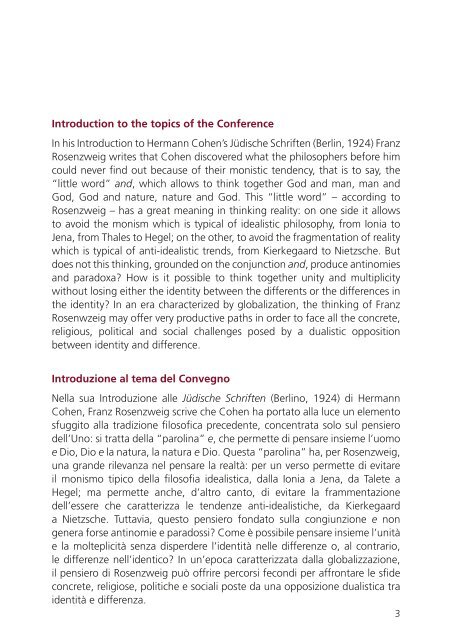Franz Rosenzweig
VZ2hG1
VZ2hG1
Create successful ePaper yourself
Turn your PDF publications into a flip-book with our unique Google optimized e-Paper software.
Introduction to the topics of the Conference<br />
In his Introduction to Hermann Cohen’s Jüdische Schriften (Berlin, 1924) <strong>Franz</strong><br />
<strong>Rosenzweig</strong> writes that Cohen discovered what the philosophers before him<br />
could never find out because of their monistic tendency, that is to say, the<br />
“little word” and, which allows to think together God and man, man and<br />
God, God and nature, nature and God. This “little word” – according to<br />
<strong>Rosenzweig</strong> – has a great meaning in thinking reality: on one side it allows<br />
to avoid the monism which is typical of idealistic philosophy, from Ionia to<br />
Jena, from Thales to Hegel; on the other, to avoid the fragmentation of reality<br />
which is typical of anti-idealistic trends, from Kierkegaard to Nietzsche. But<br />
does not this thinking, grounded on the conjunction and, produce antinomies<br />
and paradoxa? How is it possible to think together unity and multiplicity<br />
without losing either the identity between the differents or the differences in<br />
the identity? In an era characterized by globalization, the thinking of <strong>Franz</strong><br />
Rosenwzeig may offer very productive paths in order to face all the concrete,<br />
religious, political and social challenges posed by a dualistic opposition<br />
between identity and difference.<br />
Introduzione al tema del Convegno<br />
Nella sua Introduzione alle Jüdische Schriften (Berlino, 1924) di Hermann<br />
Cohen, <strong>Franz</strong> <strong>Rosenzweig</strong> scrive che Cohen ha portato alla luce un elemento<br />
sfuggito alla tradizione filosofica precedente, concentrata solo sul pensiero<br />
dell’Uno: si tratta della “parolina” e, che permette di pensare insieme l’uomo<br />
e Dio, Dio e la natura, la natura e Dio. Questa “parolina” ha, per <strong>Rosenzweig</strong>,<br />
una grande rilevanza nel pensare la realtà: per un verso permette di evitare<br />
il monismo tipico della filosofia idealistica, dalla Ionia a Jena, da Talete a<br />
Hegel; ma permette anche, d’altro canto, di evitare la frammentazione<br />
dell’essere che caratterizza le tendenze anti-idealistiche, da Kierkegaard<br />
a Nietzsche. Tuttavia, questo pensiero fondato sulla congiunzione e non<br />
genera forse antinomie e paradossi? Come è possibile pensare insieme l’unità<br />
e la molteplicità senza disperdere l’identità nelle differenze o, al contrario,<br />
le differenze nell’identico? In un’epoca caratterizzata dalla globalizzazione,<br />
il pensiero di <strong>Rosenzweig</strong> può offrire percorsi fecondi per affrontare le sfide<br />
concrete, religiose, politiche e sociali poste da una opposizione dualistica tra<br />
identità e differenza.<br />
3


